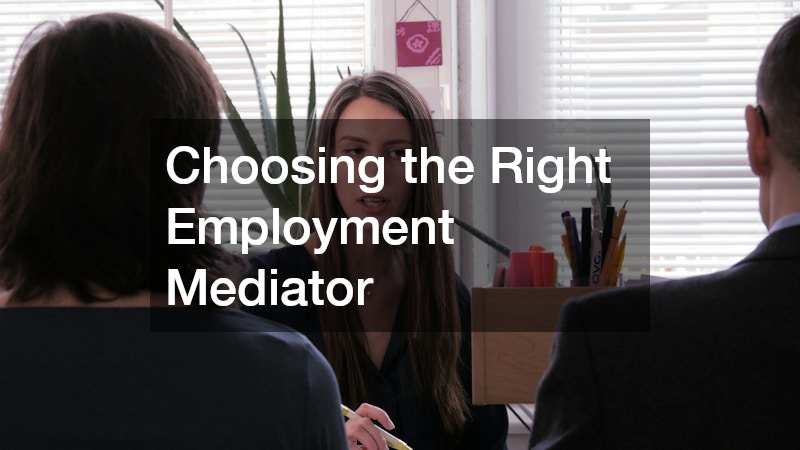How an Employment Mediator Helps Employees and Employers


This article explores the role of employment mediators and how they facilitate productive resolutions between employees and employers. Mediation can be an essential tool in resolving workplace conflicts efficiently and ethically.
What is Employment Mediation?
Definition and Purpose
Employment mediation is a structured, interactive process where a neutral third party assists disputing parties in resolving conflict through specialized communication techniques. The primary purpose of mediation is to provide a less adversarial and costly method of settling disputes compared to traditional legal proceedings.
The mediator does not provide legal advice or impose a decision, but instead helps parties to reach a mutually agreeable solution. This approach allows both employees and employers to retain more control over the outcome.
Overall, employment mediation can lead to creative solutions that might not be possible in a court of law. It also helps maintain relationships by encouraging cooperative dialogue.
Importance in the Workplace
Mediation plays a crucial role in the workplace by addressing conflicts before they escalate into larger issues. By fostering communication, mediation helps improve the work environment and employee morale.
Many organizations now see mediation as a vital tool for conflict resolution due to its effectiveness in reducing workplace tension. By openly addressing issues, employment mediation can improve trust and collaboration among team members.
Furthermore, effective mediation contributes to a positive organizational culture where employees feel heard and valued. This proactive approach can enhance productivity and employee retention.
How Does the Mediation Process Work?
Steps Involved in Mediation
The mediation process typically begins with the mediator explaining the rules and goals, establishing a respectful and solution-focused tone. This initial phase is crucial for setting expectations and ensuring that both parties feel comfortable and open to discussing their issues.
Next, both parties present their perspectives, allowing the mediator to identify underlying interests and needs. Through guided discussions, the mediator helps the parties explore potential solutions that are acceptable to both sides.
Finally, the mediation process concludes with a written agreement if both parties resolve. This agreement outlines the terms decided upon during the mediation, promoting a clear understanding and commitment to resolution.
Role of the Mediator
The mediator’s primary role is to facilitate communication between the parties by ensuring a respectful and productive dialogue. They are skilled in managing emotions and reframing negative language to prevent escalation.
By remaining neutral, the mediator encourages both parties to focus on interests rather than positions. This approach can help clarify misunderstandings and identify common ground.
The mediator also manages the process flow and time, keeping discussions on track and focused. Their expertise in conflict resolution strategies guides parties towards exploring workable solutions.
Benefits of Using an Employment Mediator
Advantages for Employees
For employees, mediation offers a safe space to express concerns and grievances without fear of retaliation. This allows them to actively participate in the resolution process.
Mediation can lead to quicker resolutions, minimizing the stress and anxiety that often accompany unresolved workplace issues. By working towards a solution collaboratively, employees often report improved workplace relationships.
Additionally, mediation helps empower employees by involving them directly in finding mutually beneficial outcomes. This inclusive approach contributes to a sense of fairness and respect within the workplace.
Advantages for Employers
Employers benefit from mediation by minimizing potential legal costs associated with unresolved disputes. Effective mediation can reduce the risk of litigation and associated expenses significantly.
Mediation also fosters a supportive workplace culture, which can enhance overall productivity. Employers often find that resolving conflicts through mediation results in improved staff retention and engagement.
Moreover, employers who use mediation demonstrate a commitment to resolving conflicts ethically and efficiently. This can enhance the organization’s reputation and attract talent who value a positive work environment.
Common Issues Addressed by Employment Mediators
Discrimination and Harassment
Employment mediators often address sensitive issues like discrimination and harassment. Through mediation, parties can engage in confidential discussions to address behaviors and reach a mutual understanding or agreement.
The mediator provides a neutral setting that encourages open communication while ensuring that both parties feel safe and heard. This process can lead to remedies such as changes in workplace policies or further training.
By addressing such issues, mediation helps cultivate a respectful and inclusive workplace. Ultimately, this benefits both individuals and the organization by promoting equality and diversity.
Contractual Disputes
Mediators play a vital role in resolving disputes related to employment contracts and agreements. These conflicts may involve issues such as salary, termination, or job responsibilities.
Through mediation, parties can negotiate terms and clarify expectations without resorting to litigation. This allows both sides to maintain professional relationships and avoid damaging publicity.
Successful mediation of contractual disputes often results in creative solutions that serve the interests of all parties involved. In resolving these matters, mediation can support a continued positive working relationship.
Choosing the Right Employment Mediator
Qualities to Look For
When selecting an employment mediator, it is essential to consider their experience in handling similar disputes. A mediator with a successful track record in employment issues can offer valuable insights and strategies.
Good communication skills and the ability to maintain neutrality are critical qualities of an effective mediator. They should also manage conflict and facilitate constructive dialogue between parties.
Other important attributes include patience, empathy, and a strong ethical foundation. Finding a mediator who embodies these qualities can significantly impact the success of the mediation process.
Questions to Ask Potential Mediators
When interviewing potential mediators, asking about their experience and specific training in employment mediation is important. Their approach to various types of workplace disputes can provide insight into their suitability.
Discussing past case outcomes and the mediator’s role in reaching those resolutions can also be helpful. Understanding how they have handled similar conflicts can build confidence in their mediation capabilities.
Additionally, clarifying logistical details such as fees, availability, and process expectations ensures that both parties are aligned with the mediation approach. This supports a smooth and effective mediation experience.
.



